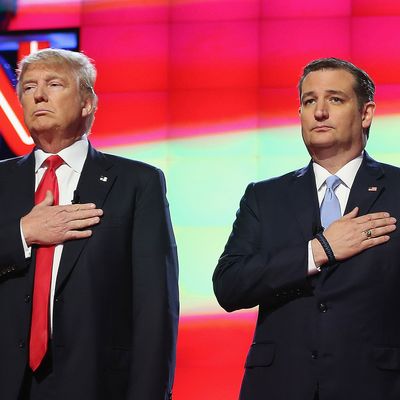
The Republican Party’s fear of nominating Donald Trump has two sources. First, he is profoundly unpopular with the general public, and second, even if he is somehow elected, they have good reason to doubt whether he would stick with the party agenda. These are two very good reasons to oppose his nomination. But the completely justifiable Republican opposition to Trump has caused them to proclaim him a heretic against conservatism, or even a liberal — which, on the basis of his stated policies, he most certainly is not. And what’s more, the opposition of Republican elites has given the news media the freedom to cover him far more harshly (and accurately) than it would any other Republican front-runner.
A good example of the inordinately tough (and fair) coverage of Trump comes in the New York Times’ report on his health-care plan. The story follows the theme of a lot of Trump coverage, which is that Trump’s ideas are absurd. Trump’s plan is to repeal Obamacare, which he calls a disaster. He would replace it with a combination of four things: allow insurance companies to sell policies across state lines; make tax deductions available to individuals who buy insurance; expand the use of health savings accounts; and let the federal government negotiate to lower the cost of prescription drugs.
Trump’s plan, the Times reports, “is exasperating Republican experts on health care, who call his proposals an incoherent mishmash that could jeopardize coverage for millions of newly insured people.” It is both true that Trump’s plan is exasperating Republican health-care experts and that his plan would jeopardize coverage for millions of newly insured people. But that is not because Trump’s ideas differ so much from those of other Republicans. Ted Cruz has virtually the same health-care plan as Trump:
Listing “three specific reforms,” Cruz said, “Number one, allow people to buy insurance across state lines.”
He continued, “Number two, we need to expand health saving accounts,” and he concluded with, “Number three, we need to de-link health insurance from employment.”
If you go to Cruz’s site, it’s the same stuff he can fit into a television sound bite: “We need to enact reforms that make health care personal, portable, and affordable. Specifically, we need open insurance markets across state lines, expand Health Savings Accounts, and delink health insurance from employment.” The only difference — aside from the fact that Cruz spends more time swearing to repeal every word of Obamacare until it’s dead and buried — is that Cruz, unlike Trump, opposes letting the federal government negotiate for lower Medicare drug costs. (Trump is right, and Cruz is wrong.)
So Cruz and Trump both have plans that would blow up the markets created by Obamacare without a feasible replacement. What’s happening here is that the justifiable desperation of Republican elites to stop Trump has led to the odd paradox of them savaging ideas they normally support.
Consider Trump’s proposal to let insurers sell policies across state lines. As the Times reports, “state insurance officials have resisted such legislation, saying it could undermine their power to regulate insurance and their ability to protect consumers.” That is true. Selling insurance across state lines would make sense if the regulation was set nationally by federal officials. State-level regulation that applies nationwide would be a disaster. It would mean that the insurance industry would be regulated by whichever state set the laxest, most-insurance-friendly rules. In practice, it would mean that some small state would lure the insurance industry to set up shop there, bringing jobs and tax revenue, by giving insurers whatever health regulations, or lack thereof, they prefer. Even rules against fraud, let alone protections for consumers who have preexisting conditions, would become impossible.
Republicans have endorsed this idea for years. When Trump touted this idea in a debate, though, The Weekly Standard, which has crusaded against Trump, savaged it (”his one idea on health care isn’t even a good one”). The Standard has always liked the notion of letting people purchase insurance across state lines. But the imperative of saving the party comes first. The real concern for Republicans is not Trump’s health-care plan but his previous positions endorsing single-payer insurance and calling himself a “liberal” on health care.
Hence, the news media is now filled with the blunt assessments of Trump’s plans by members of the Republican policy apparatus. Cruz won’t suffer from coverage like this — not because reporters are biased, but because they won’t find Republican sources willing to attack him so bluntly. Indeed, if Trump wins the nomination and unifies the party — or if Cruz or somebody else gets it — then Republicans will go back to attacking accurate reporting as liberal bias.






























